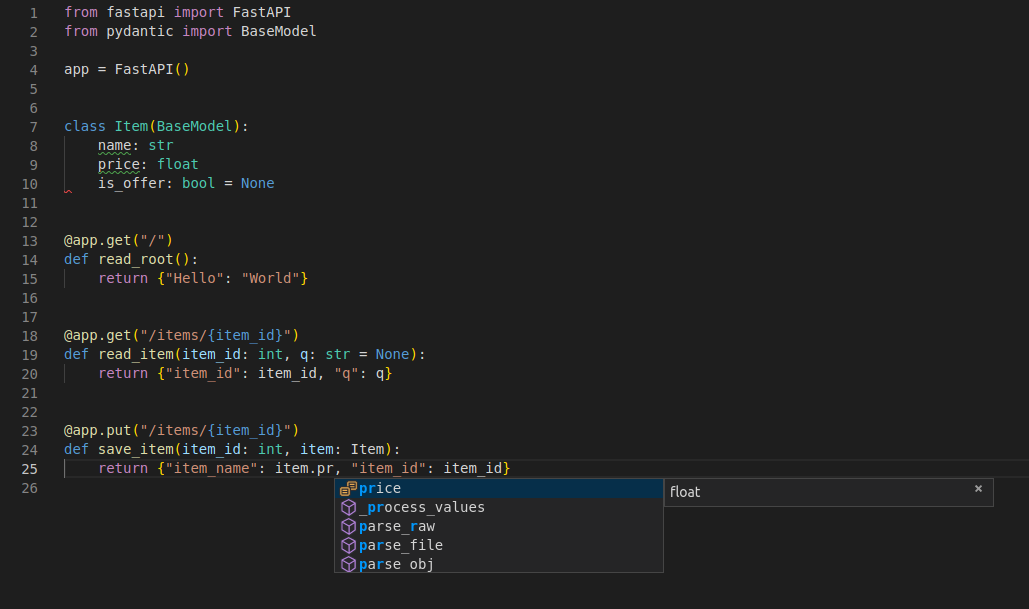- Sort Score
- Result 10 results
- Languages All
Results 21 - 30 of 33 for See (0.22 sec)
-
docs/en/docs/async.md
To see how to achieve this parallelism in production see the section about [Deployment](deployment/index.md){.internal-link target=_blank}. ## `async` and `await`
Plain Text - Registered: Sun May 05 07:19:11 GMT 2024 - Last Modified: Thu Apr 18 19:53:19 GMT 2024 - 23K bytes - Viewed (0) -
README.md
``` ...to: ```Python ... "item_price": item.price ... ``` ...and see how your editor will auto-complete the attributes and know their types:  For a more complete example including more features, see the <a href="https://fastapi.tiangolo.com/tutorial/">Tutorial - User Guide</a>.Plain Text - Registered: Sun May 05 07:19:11 GMT 2024 - Last Modified: Thu May 02 22:37:31 GMT 2024 - 22.6K bytes - Viewed (0) -
docs/en/docs/tutorial/security/simple-oauth2.md
For this simple example, we are going to just be completely insecure and return the same `username` as the token. !!! tip In the next chapter, you will see a real secure implementation, with password hashing and <abbr title="JSON Web Tokens">JWT</abbr> tokens. But for now, let's focus on the specific details we need. === "Python 3.10+" ```Python hl_lines="87"Plain Text - Registered: Sun May 05 07:19:11 GMT 2024 - Last Modified: Thu Apr 18 19:53:19 GMT 2024 - 12.5K bytes - Viewed (0) -
docs/en/docs/advanced/security/oauth2-scopes.md
Every time you "log in with" Facebook, Google, GitHub, Microsoft, Twitter, that application is using OAuth2 with scopes. In this section you will see how to manage authentication and authorization with the same OAuth2 with scopes in your **FastAPI** application. !!! warning This is a more or less advanced section. If you are just starting, you can skip it.
Plain Text - Registered: Sun May 05 07:19:11 GMT 2024 - Last Modified: Thu Jan 11 21:21:35 GMT 2024 - 20.5K bytes - Viewed (0) -
docs/uk/docs/index.md
Plain Text - Registered: Sun May 05 07:19:11 GMT 2024 - Last Modified: Mon Apr 29 05:18:04 GMT 2024 - 24.2K bytes - Viewed (0) -
docs/en/docs/index.md
``` ...to: ```Python ... "item_price": item.price ... ``` ...and see how your editor will auto-complete the attributes and know their types:  For a more complete example including more features, see the <a href="https://fastapi.tiangolo.com/tutorial/">Tutorial - User Guide</a>.Plain Text - Registered: Sun May 05 07:19:11 GMT 2024 - Last Modified: Thu May 02 22:37:31 GMT 2024 - 19.8K bytes - Viewed (0) -
docs/en/docs/tutorial/sql-databases.md
**FastAPI** doesn't require you to use a SQL (relational) database. But you can use any relational database that you want. Here we'll see an example using <a href="https://www.sqlalchemy.org/" class="external-link" target="_blank">SQLAlchemy</a>. You can easily adapt it to any database supported by SQLAlchemy, like: * PostgreSQL * MySQL * SQLite
Plain Text - Registered: Sun May 05 07:19:11 GMT 2024 - Last Modified: Thu Apr 18 19:53:19 GMT 2024 - 29.6K bytes - Viewed (0) -
docs/en/docs/deployment/docker.md
Plain Text - Registered: Sun May 05 07:19:11 GMT 2024 - Last Modified: Thu May 02 22:37:31 GMT 2024 - 34K bytes - Viewed (0) -
docs/en/docs/tutorial/dependencies/classes-as-dependencies.md
Plain Text - Registered: Sun May 05 07:19:11 GMT 2024 - Last Modified: Thu Apr 18 19:53:19 GMT 2024 - 11.4K bytes - Viewed (0) -
docs/en/docs/tutorial/dependencies/dependencies-with-yield.md
!!! tip Prefer to use the `Annotated` version if possible. ```Python hl_lines="13-14" {!> ../../../docs_src/dependencies/tutorial008c.py!} ``` In this case, the client will see an *HTTP 500 Internal Server Error* response as it should, given that we are not raising an `HTTPException` or similar, but the server will **not have any logs** or any other indication of what was the error. 😱Plain Text - Registered: Sun May 05 07:19:11 GMT 2024 - Last Modified: Sat Feb 24 23:06:37 GMT 2024 - 14.1K bytes - Viewed (0)